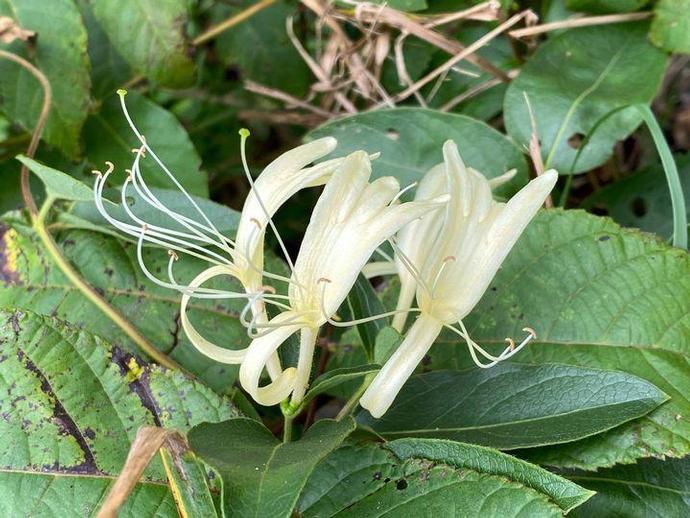September 23, 2021
Ben here with the Thursday edition of #BenInNature presented by our friends at Carter Bank & Trust!
Japanese honeysuckle (Lonicera japonica) normally blooms in the spring and early summer, although I found this plant still blooming just last week!
I remember being shown as a child how to pluck flowers from honeysuckle, pinch the rear of the flower in such a way as to cut through the flower without breaking the style, and then pull the style through the rear of the flower, drawing out a drop of delicious nectar with it. It's pretty tasty stuff (just make sure that the plants haven't been sprayed with any weed killer if you decide to try it yourself)!
As the name suggests, Japanese honeysuckle is native to eastern Asia but has since become an invasive species in a number of countries around the world. It's actually been classified as a "noxious weed" in Virginia and a few other states. Like many invasive species, honeysuckle was initially brought to the U.S. from Japan in the early 1900s to serve as an ornamental plant. It's still deliberately planted today to serve as an attractive erosion control and forage for deer.
While honeysuckle normally invades areas that have already been disturbed, such as roadsides and floodplains, it has the potential to invade forests, particularly if some amount of logging has taken place. Once it invades, it spreads rapidly, outcompeting native plants for sunlight and nutrients. While it may produce attractive and sweet-smelling flowers and seem like a nice addition to the garden, it's best to plant native species instead.
ABOUT #BenInNature
Social distancing can be difficult, but it presents a great opportunity to become reacquainted with nature. In this series of posts, Administrator of Science Ben Williams ventures outdoors to record a snapshot of the unique sights that can be found in the natural world. New updates are posted Monday - Friday, with previous posts highlighted on the weekends. This series of posts is made possible thanks to the support of VMNH Corporate Partner Carter Bank & Trust (www.cbtcares.com).
NATURE PHOTO IDENTIFICATIONS
If you discover something in nature that you would like help identifying, be sure to message us right here on Facebook with a picture (please include location and date of picture) and we'll have our experts help you identify it!

 Hours & Admissions
Hours & Admissions Directions
Directions

